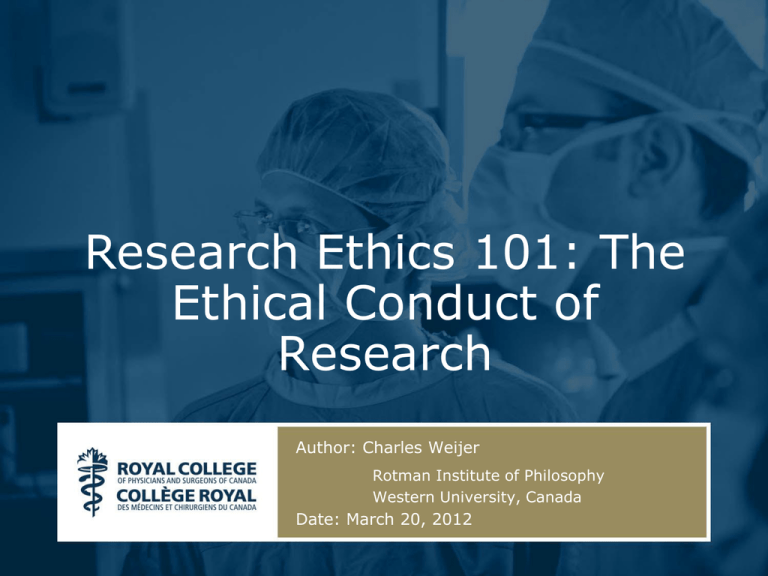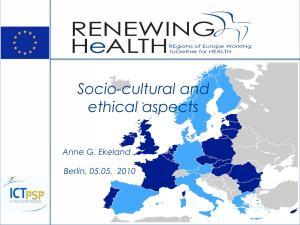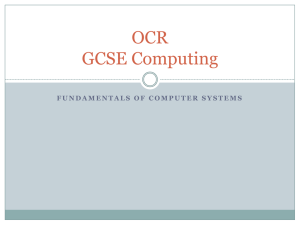PowerPoint
advertisement

Research Ethics 101: The Ethical Conduct of Research Author: Charles Weijer Rotman Institute of Philosophy Western University, Canada Date: March 20, 2012 Conflict of interest disclosure • I do not hold any research grants funded by industry or serve on any advisory committees of a pharmaceutical company • I have no other relevant financial relationships with members of the pharmaceutical industry or medical supply companies. 2 Objectives • At the end of the session, participants will be able to: 1. Explain the historical imperative for protections of human research participants; 2. Define the four ethical principles; and, 3. Apply the principles to their own research studies. 3 Why is it important? • Health research improves our understanding of disease, and informs practices that improve health • Both knowledge and health are important public goods • Health research depends on the voluntarism of research subjects • State has an obligation to protect and promote the liberty and welfare interests of human research subjects • Promulgates regulations and guidelines • Creates oversight structures, e.g., research ethics board (REB) 4 Why is it important? • Health research has a lengthy history of abuses • The interests of research subjects have all too often been sacrificed to scientific ends or the ends of the state • Well known instances • Nazi hypothermia experiments • Tuskegee syphilis study • Mind-control research at the Allan Memorial in Montreal 5 Tuskegee syphilis study • Longest running study in the U.S. PHS; ran from 1932 to 1972 • Studied the natural history of syphilis in 400 African American males • Motivated by the concern that syphilis might be less harmful in this group 6 Tuskegee syphilis study • Syphilis untreated, even when penicillin became available in the late 1940s • Letters “not to treat” were inserted in army service records • Told that nontherapeutic procedures were “special treatment[s]” 7 “Special treatment” A 1933 photo of a subject undergoing a lumbar puncture (spinal tap). (Archives of the Center for Disease Control, Tuskegee Study Files.) 8 U.S. Senate inquiry Senator Kennedy: What were the shots for, to cure the bad blood? Mr. Pollard: Bad blood, as far as I know of. Senator Kennedy: Did you think they were curing bad blood? Mr. Pollard: I didn't know. I just attended the clinic. Senator Kennedy: They told you to keep coming back and you did? Mr. Pollard: When they got through giving the shots, yes. Then they gave us that spinal puncture. Senator Kennedy: Did they tell you why they were giving a spinal puncture? Mr. Pollard: No. Senator Kennedy: Did you think it was because they were trying to help you? Mr. Pollard: To help me, yes. Senator Kennedy: You wanted some help? Mr. Pollard: That is right. They said I had bad blood and they was working on it. 9 Belmont Report • National Commission for the Protection of Human Subjects of Biomedical and Behavioral Research (1974-1978) • Charged with defining ethical principles to guide the conduct of research • Belmont Report (1978) • Respect for persons • Beneficence • Justice 10 Regulation • World Medical Association Declaration of Helsinki (1964, rev. 2008) www.wma.net • Council for International Organizations of Medical Sciences (CIOMS) International Ethical Guidelines for Biomedical Research Involving Human Subjects (2002) www.cioms.ch • International Conference on Harmonization (ICH) Good Clinical Practice Guidelines www.ich.org 11 Tri-Council Policy Statement 2 • Joint policy of CIHR, NSERC, SSHRC • Version 1, 1998; revised in 2010 • Applies to all research funded by Councils or conducted at an institution that receives Council funding • Available at www.pre.ethics.gc.ca 12 The Research Ethics Board (REB) • Is an arm of the state whose mandate is to ensure that the liberty and welfare interests of human research subjects are protected and promoted • Ensures that proposed research projects comply with relevant regulations, guidelines, and ethical principles • Unlike clinical practice, clinical research is subject to up front review because research exposes people to risk (at least in part) for the benefit of others • Is composed of researchers, ethicist, lawyer, community representative (TCPS 6.4) 13 What is research? • Defined as an “undertaking intended to extend knowledge through a disciplined inquiry or systematic investigation” (TCPS 2.1) • It is not research if: • It isn’t disciplined inquiry or systematic investigation; or, • It doesn’t seek to extend knowledge. • Quality assurance initiatives — systematic investigations to inform change in only local practice or policy — are not research and are not subject to REB review. (TCPS 2.5) 14 What research requires REB review? TCPS 2.1: “The following requires ethics review and approval by an REB before the research commences: a) research involving living human participants; b) research involving human biological materials, as well as human embryos, fetuses, fetal tissue, reproductive materials and stem cells. This applies to materials derived from living and deceased individuals.” 15 Qualitative research TCPS 10.1: “Researchers shall submit their research proposals, including proposals for pilot studies, for REB review and approval of its ethical acceptability prior to the start of recruitment of participants, or access to data. Subject to the exceptions in Article 10.5, REB review is not required for the initial exploratory phase (often involving contact with individuals or communities) intended to discuss the feasibility of the research, establish research partnerships, or the design of a research proposal (see Article 6.11).” 16 Ethical principles • Respect for persons • Obligation to take seriously the choices of autonomous subjects and they have an obligation to protect those who cannot decide for themselves. • Beneficence • Obligation to protect human research subjects from harm and where possible promote their good. • Justice • Benefits and burdens of research participation ought to be distributed equitably • Respect for communities • Obligation to protect and promote the interests of communities in research 17 Ethical principles and rules Ethical principle Respect for persons Ethical rule Obtain the informed consent of prospective research subjects Protect the confidentiality of private information Beneficence Therapeutic procedures must satisfy clinical equipoise Risks of non-therapeutic procedures must be (1) minimized and (2) reasonable in relation to knowledge to be gained Justice Subject selection procedures must be fair Compensate subjects harmed as a result of research participation Respect for communities Respect communal values, protect and empower social institutions Where applicable, abide by the decisions of legitimate communal authority 18 Informed consent • General presumption that informed consent must be obtained from research subjects (TCPS 3.1-3.5) • Additional protections for those who cannot provide informed consent (TCPS 3.9, 4.6) • Inclusion must be necessary to answering the study hypothesis • Consent from a surrogate decision maker • Threshold for non-therapeutic risks to which they may be exposed (minimal risk) 19 Waiver of consent (TCPS 3.7) • The research involves no more than minimal risk to the participants; • The lack of the participant’s consent is unlikely to adversely affect the welfare of the participant; • It is impossible or impracticable to carry out the research and to answer the research question properly, given the research design, if the prior consent of the participant is required; 20 Waiver of consent (TCPS 3.7) Con’t • whenever possible and appropriate, after participation…participants will be debriefed; and • the research does not involve a therapeutic intervention, or other clinical or diagnostic interventions. 21 Confidentiality • Researchers are obliged to take steps to protect the confidentiality of private health information (TCPS 5.1) • REB has an obligation to review confidentiality procedures for adequacy (TCPS 5.3) • Steps taken to protect the confidentiality of private health information ought to be disclosed in the informed consent (TCPS 5.2) 22 Secondary use of data • REB review is not required for research that involves secondary use of anonymous data or samples (TCPS 2.4) • REB review is required if the data or samples are identifiable, or if the process of data linkage generates identifiable information • Informed consent may not be required for secondary use of data or samples provided that: • The identifiable data is essential to the research; • Appropriate safeguards for confidentiality are in place; and, • It would be impossible or impracticable to seek individual consent (TCPS 5.5). 23 Qualitative research • “The requirement for consent and the protection of privacy and confidentiality do not change with the nature of the research.” (TCPS p.138) • Article 10.3: “In research involving observation in natural environments or virtual settings where people have a reasonable or limited expectation of privacy, the researcher shall explain the need for an exception to the general requirement for consent.” • Informed consent is required to disclose the identity of human research subjects (TCPS 10.4) 24 Ethical principles and rules Ethical principle Respect for persons Ethical rule Obtain the informed consent of prospective research subjects Protect the confidentiality of private information Beneficence Therapeutic procedures must satisfy clinical equipoise Risks of non-therapeutic procedures must be (1) minimized and (2) reasonable in relation to knowledge to be gained Justice Subject selection procedures must be fair Compensate subjects harmed as a result of research participation Respect for communities Respect communal values, protect and empower social institutions Where applicable, abide by the decisions of legitimate communal authority 25 Benefit-harm analysis • The REB must “assesses the ethical acceptability of the research through consideration of the foreseeable risks, the potential benefits and the ethical implications of the research, both at the stage of the initial review and throughout the life of the project” (TCPS p.22) • Risks that are considered: • physical; • psychological; • social; or, • economic 26 Benefit-harm analysis • We must distinguish between procedures administered with therapeutic warrant and those administered without such warrant and purely to answer the scientific question • Therapeutic procedures: potential benefit to subject • Non-therapeutic procedures: potential benefit to society 27 Therapeutic procedures • A state of clinical equipoise must exist at the start of a study (TCPS p. 148) • The various therapeutic procedures within the study must be consistent with competent medical care • At the start of the trial there must exist a state of honest, professional disagreement in the community of expert practitioners as to the preferred treatment 28 Nontherapeutic procedures • Two requirements: • Risks to subjects are minimized consistent with sound scientific design • Risks reasonable in relation to knowledge to be gained • If the study involves a vulnerable population, the risks of nontherapeutic procedures must be no more than: • Minimal risk (Canada) (TCPS 3.9d)“probability and magnitude of possible harms implied by participation in the research is no greater than those encountered by participants in those aspects of their everyday life that relate to the research” (TCPS p. 23) • Minor increase above minimal risk (US) 29 Benefit-harm analysis Protocol Therapeutic procedures Distinguish therapeutic and nontherapeutic procedures Nontherapeutic procedures Clinical equipoise exists Risks minimized consistent with sound scientific design Consistent with competent care Risks reasonable in relation to knowledge to be gained Risks reasonable in relation to potential benefits to subjects No more than minor increase over minimal risk Yes Both therapeutic and nontherapeutic procedures pass Yes Acceptable Vulnerable population? No No Unacceptable 30 Ethical principles and rules Ethical principle Respect for persons Ethical rule Obtain the informed consent of prospective research subjects Protect the confidentiality of private information Beneficence Therapeutic procedures must satisfy clinical equipoise Risks of non-therapeutic procedures must be (1) minimized and (2) reasonable in relation to knowledge to be gained Justice Subject selection procedures must be fair Compensate subjects harmed as a result of research participation Respect for communities Respect communal values, protect and empower social institutions Where applicable, abide by the decisions of legitimate communal authority 31 Selection of subjects • TCPS Section 4: Fairness and Equity in Research Participation • Undue burdens (TCPS 4.7): • Those who will not share in study benefits • Groups exposed to repeated study may be unduly burdened by research participation • Access to benefits: • Exclusion of groups may lead to systematic gaps in medical knowledge • Children, women, elderly, members of minority groups may not be excluded without careful justification (TCPS 4.2-4.5) 32 Research-related injury • Researchers have an ethical torisk of “Harm, disability or death suffered obligation by a subject at provide and compensation or treatment forinjury is (1) biomedical behavioral research…where such research-related injuries proximately caused by such research, and (2) on balance exceeds that reasonably associated with such illness from which the • In the consent process, subjects must be subject may be suffering, as well as with treatment usually informed of the availability of compensation associated with such illness at the time the subject began for injury (TCPS 3.2) participation in the research.” (HEW Task Force, 1977) 33 Ethical principles and rules Ethical principle Respect for persons Ethical rule Obtain the informed consent of prospective research subjects Protect the confidentiality of private information Beneficence Therapeutic procedures must satisfy clinical equipoise Risks of non-therapeutic procedures must be (1) minimized and (2) reasonable in relation to knowledge to be gained Justice Subject selection procedures must be fair Compensate subjects harmed as a result of research participation Respect for communities Respect communal values, protect and empower social institutions Where applicable, abide by the decisions of legitimate communal authority 34 Communities Recognizing the heterogeneity of communities, researchers may in particular instances have obligations to: • Engage the community in the development of the study (TCPS 9.1, 9.2) • Disclose information to the community and, where appropriate, seek community consent (TCPS 9.3) • Negotiate access to and storage of data and samples (TCPS 9.16, 9.19, 9.20) • Involve the community in the dissemination and publication of study findings (TCPS 9.17) • Involve the community in the conduct of the study (TCPS 9.12, 9.13, 9.14) 35 Ethical principles and rules Ethical principle Respect for persons Ethical rule Obtain the informed consent of prospective research subjects Protect the confidentiality of private information Beneficence Therapeutic procedures must satisfy clinical equipoise Risks of non-therapeutic procedures must be (1) minimized and (2) reasonable in relation to knowledge to be gained Justice Subject selection procedures must be fair Compensate subjects harmed as a result of research participation Respect for communities Respect communal values, protect and empower social institutions Where applicable, abide by the decisions of legitimate communal authority 36 Online learning • RCPSC Bioethics Education Project (click on “bioethics modules” after sign in) • Curriculum with 5 primers on ethics, 5 executive summaries, 46 case discussions, and 5 self-assessment modules • Primer on “Research Ethics” by Andrew McRae (Calgary) • Research ethics cases: • • • • • • Research Ethics Review Consent to Research Participation Physicians' Obligations to Patients in Clinical Research Research Involving Vulnerable Populations Research Involving Children Informing Study Participants of Research Results 37








